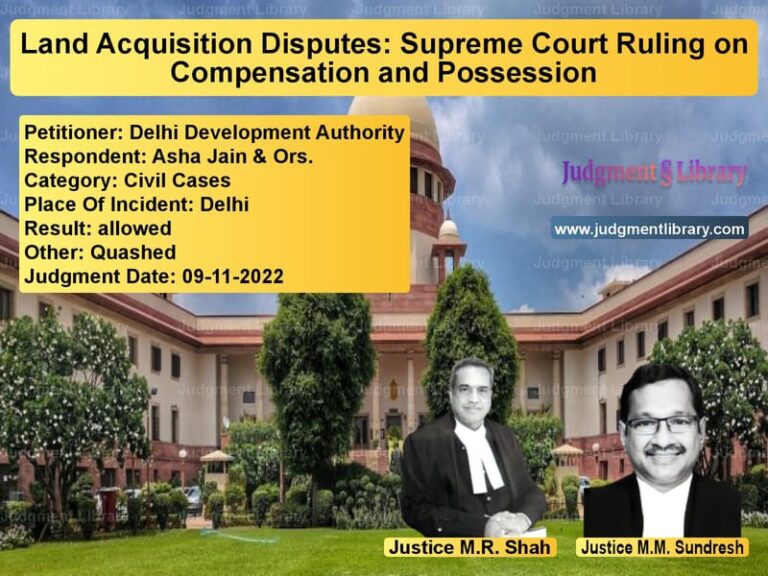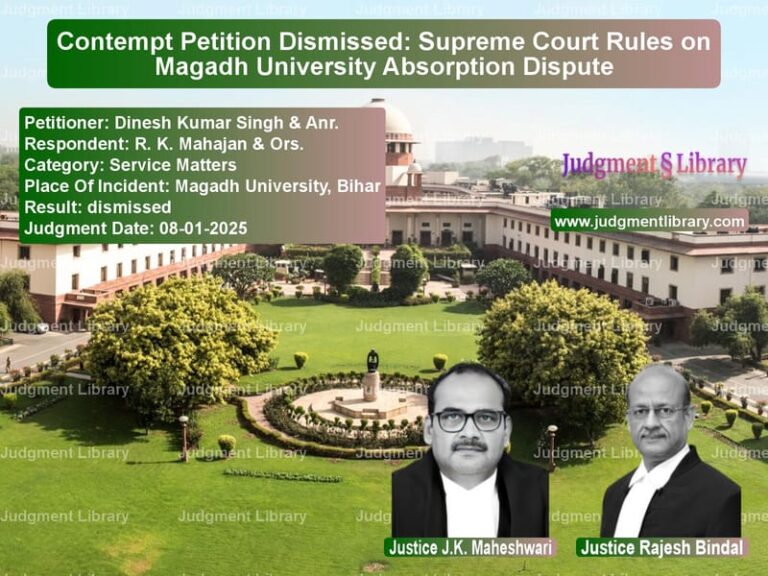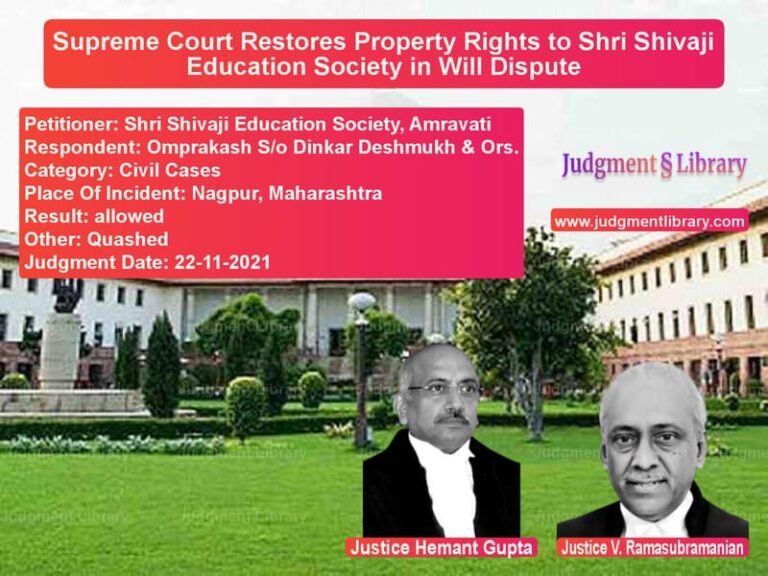Judicial Exam Disqualification for Rule Violation: Supreme Court’s Verdict on TNPSC Civil Judge Recruitment
The Supreme Court of India recently ruled in the case of The State of Tamil Nadu & Ors. vs. G. Hemalathaa & Anr., addressing a dispute concerning the Tamil Nadu Public Service Commission (TNPSC) Civil Judge recruitment process. The case revolved around a candidate whose answer sheet was disqualified for violating examination instructions and whether such a disqualification could be reversed on humanitarian grounds.
Background of the Case
The Tamil Nadu Public Service Commission (TNPSC) issued a recruitment notification on April 9, 2018, inviting applications for 320 Civil Judge vacancies in the Tamil Nadu State Judicial Service. The selection process included a preliminary examination, a written test, and an interview.
The respondent, G. Hemalathaa, cleared the preliminary examination and appeared for the written test conducted on August 11 and 12, 2018. However, when the results were announced on September 19, 2018, her name did not appear on the list of successful candidates. Upon inquiry, TNPSC informed her on January 7, 2019, that her Law Paper 1 answer sheet had been invalidated due to a violation of examination instructions.
Feeling aggrieved, she filed a writ petition before the Madras High Court, seeking a direction to TNPSC to declare her results and appoint her as a Civil Judge if she had scored higher than the last selected candidate in her category. The High Court ruled in her favor, directing TNPSC to assess her answer sheet and conduct an interview if she qualified. TNPSC challenged this decision before the Supreme Court.
Key Legal Issues
- Whether violating examination instructions can justify disqualification from a judicial recruitment process.
- Whether courts can interfere in recruitment processes by granting relief to disqualified candidates on humanitarian grounds.
- Whether the High Court’s order contradicts the mandatory nature of examination rules set by TNPSC.
Arguments by the Appellants (TNPSC)
TNPSC defended its decision to disqualify Hemalathaa on the following grounds:
- The recruitment notification explicitly barred candidates from using a pencil on their answer sheets.
- Examination instructions, issued before the test, clearly stated that any violation would result in disqualification.
- The respondent admitted to underlining portions of her answer sheet with a pencil, violating Instruction 22(1)(II).
- Rules must be applied uniformly, and relaxing them for one candidate would set a precedent leading to future disputes.
- The High Court erred by granting relief on humanitarian grounds despite acknowledging the rule violation.
Arguments by the Respondent (G. Hemalathaa)
The respondent countered:
- Her use of a pencil for underlining was unintentional and did not give her any unfair advantage.
- TNPSC did not provide her a chance to explain before disqualifying her.
- The High Court was justified in exercising its discretion to ensure fairness.
- Her career prospects should not be permanently damaged due to an inadvertent mistake.
Supreme Court’s Observations
1. Mandatory Nature of Examination Instructions
The Court emphasized the binding nature of TNPSC’s examination rules. It held:
“The instructions issued by the Commission are mandatory, having the force of law, and they must be strictly complied with.”
2. High Court’s Error in Granting Relief
The Court criticized the High Court’s decision to override TNPSC’s rules, stating:
“The High Court, after summoning and reviewing the answer sheet, found that the candidate had indeed violated the instructions. Despite this, it granted relief based on humanitarian considerations. Such an approach undermines the integrity of the examination process.”
3. No Room for Leniency
The Court firmly rejected the argument that Hemalathaa’s action was unintentional and should be excused:
“The rules are meant to be followed by all candidates uniformly. If the respondent is granted relief, it would open the floodgates for similar claims, leading to dilution of examination standards.”
4. Precedent for Future Cases
The Court warned against setting a precedent that allows leniency in competitive exams:
“If we approve the High Court’s judgment, it will create a precedent where any candidate violating exam rules can seek relief, undermining the fairness of recruitment processes.”
5. No Scope for Relief Under Article 142
The respondent requested the Court to exercise its discretionary powers under Article 142 of the Constitution to grant relief without setting a precedent. The Court refused, stating:
“The power under Article 142 is meant to serve the ends of justice but cannot be invoked to override clearly established rules.”
Final Verdict
The Supreme Court ruled:
- The respondent was rightly disqualified under TNPSC rules.
- The High Court’s order granting relief was erroneous and set aside.
- Examination rules must be strictly followed, and no exceptions can be made on humanitarian grounds.
- TNPSC’s decision to disqualify the respondent was upheld.
Conclusion
This judgment reinforces the principle that examination rules must be applied strictly and uniformly. It upholds the integrity of competitive recruitment processes by ensuring that no exceptions are made for rule violations, regardless of intent. The ruling serves as a precedent for future cases, affirming that courts should not interfere in recruitment decisions based on sympathy but must uphold the prescribed rules.
Petitioner Name: The State of Tamil Nadu & Ors..Respondent Name: G. Hemalathaa & Anr..Judgment By: Justice L. Nageswara Rao, Justice Hemant Gupta.Place Of Incident: Tamil Nadu.Judgment Date: 28-08-2019.
Don’t miss out on the full details! Download the complete judgment in PDF format below and gain valuable insights instantly!
Download Judgment: The State of Tamil N vs G. Hemalathaa & Anr. Supreme Court of India Judgment Dated 28-08-2019.pdf
Direct Downlaod Judgment: Direct downlaod this Judgment
See all petitions in Recruitment Policies
See all petitions in Public Sector Employees
See all petitions in Employment Disputes
See all petitions in Judgment by L. Nageswara Rao
See all petitions in Judgment by Hemant Gupta
See all petitions in allowed
See all petitions in Quashed
See all petitions in supreme court of India judgments August 2019
See all petitions in 2019 judgments
See all posts in Service Matters Category
See all allowed petitions in Service Matters Category
See all Dismissed petitions in Service Matters Category
See all partially allowed petitions in Service Matters Category







